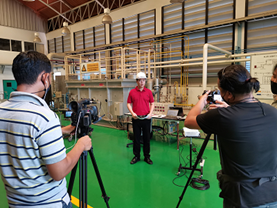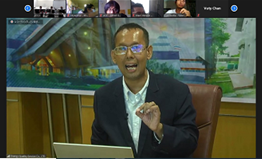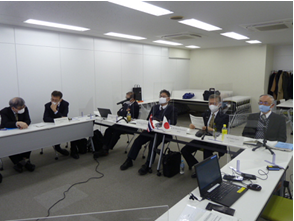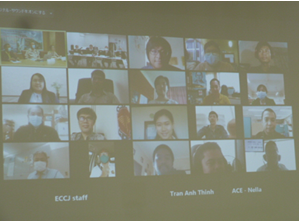Holding of training of trainers (TOT) from Thailand as part of the FY2020 energy conservation support project for ASEAN countries
Under the instruction and financial support of the Ministry of Economy, Trade and Industry (METI) (in the project for contributing to the rational use of energy in developing nations and the EE&C capacity building program), the Energy Conservation Center, Japan (ECCJ) held simulated training from Thailand in an online format during the three-day period from December 14 to 16, 2020. Previously, the participants from ASEAN countries visited a mini plant located in Thailand, where training was given in implementing energy audits while operating the facilities. However, due to the impact of COVID-19 the training in this fiscal year was held using a format in which the training situation was confirmed online.
(1) ECCJ enabled participants to acquire energy auditing methods by viewing videos that had been filmed in advance.
(2) ECCJ allowed participants to learn heat and electricity-related technologies using videos and live streaming.
(3) ECCJ held examinations to check the participants’ degree of understanding.
 |
 |
|
View of video shooting beforehand |
View of live streamed lecture |
 |
 |
|
View of ECCJ venue |
View of participants in each ASEAN country |
ECCJ held simulated training using a mini plant facility in Thailand in an online format as part of the Scheme 2 Program of the “FY2020 EE&C Capacity Building Program for ASEAN Countries”. A total of 17 persons took part in the training, comprising 16 qualified energy manager trainer candidates from each ASEAN country together with one person from the ASEAN Centre for Energy (ACE). During the three-day period from December 14 to 16, the training was completed together with examinations to confirm the participants’ degree of understanding.
(1) ECCJ gave lectures following the same curriculum contents as in other years relating to equipment including pumps, fans, compressed air, steam traps, open burners, lighting and air conditioning, and allowed participants to learn energy auditing methods.
(2) On the final day, ECCJ held examinations online to confirm the participants’ degree of understanding.
(3) Regarding the online training that was held for the first time this year, ECCJ confirmed many advantages, including (1) saving on transportation costs because participants did not have to travel to the site, (2) the possibility to have participation by many trainees, and (3) the ability to provide more opportunities for them to receive lectures. However, there was the disadvantage that participants were unable to actually operate the facilities, so although they could see what was going on, they could not sense the temperatures, sounds and atmosphere. Going forward, it is believed that a combination of training methods in which participants can actually operate the facilities together with online training will realize the most effective training method.
(4) ECCJ will comprehensively evaluate the results of the examinations this time together with the audit reports and examination results from the ECAP22 training which will be implemented in February 2021, and will award certification as trainers.

